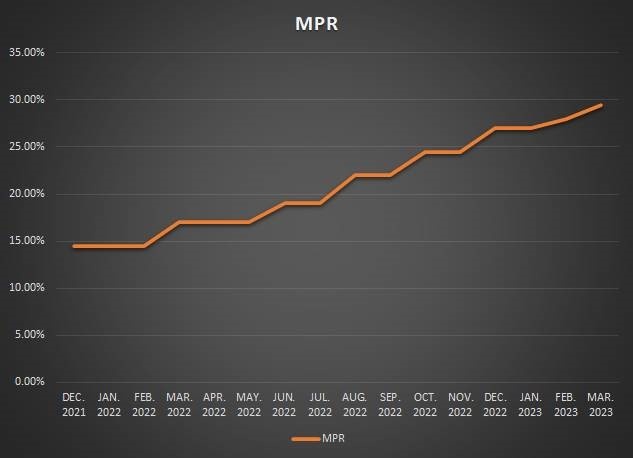…as inflation drops significantly to 45% in March 2023
Market observers are predicting that the Bank of Ghana (BoG) Monetary Policy Committee (MPC) will keep the benchmark policy rate at its current level in the next meeting in May, following a significant decline in consumer inflation to 45 percent in March 2023.
Analysts at Rand Merchant Bank (RMB) and GCB Capital Research have both shared this view, stating that inflation is set to continue on a disinflationary run through the second and third quarters. Despite the modest decrease in inflation, it remains over four times higher than the BoG’s upper policy target of 10 percent.
GCB Capital expects the tight monetary policy stance to continue, with the MPC holding its policy rate at 29.5 percent for a while to firmly anchor inflation expectations.
“We expect the tight monetary policy stance to run a little longer, and the Monetary Policy Committee could hold the policy rate at 29.5 percent for a while to anchor inflation expectations firmly,” GCB Capital said in a note signed by its Research Lead, Courage Boti.
It further stated that the 150 basis points (bps) hike in the policy rate in March and the 200 bps increase in the cash reserve ratio “have forestalled immediate liquidity pressure from the cash-rich banking system to inflation”.
With three consecutive months of disinflation, month-on-month deflation across the food and non-food baskets and the main items driving inflation, the market expects sharp drops in inflation over the coming months – sustained by cedi appreciation, easing pump prices of fuel and favourable base drift.
For the first time in several months, petrol and diesel prices were not the main factors underpinning the headline inflation reading. Food inflation and sharp depreciation in the cedi over the past 12 months were two of the main factors that supported disinflation last month.
Similarly, RMB in its Africa Market Insider briefing said it expects the trend to continue over the next few months, particularly if demand for the American greenback remains relatively muted – trading at under US$1 = GH¢13.
“The next few months are likely to see continued disinflation, especially if US$/GH¢ continues to trade below the 13.00 handle. The monetary policy decision to hike interest rates to 29.5 percent in March will further anchor inflation expectations during the latter part of the year,” it noted.
“Ultimately, while inflation remains elevated, the decline in the profile is in line with the Bank of Ghana’s expectations. We therefore expect the MPC to maintain rates at the current level at the next meeting,” RMB added.
Data from Ghana Statistical Services (GSS) show that inflation reached its highest point at 54.1 percent in December 2022 following a 19-month acceleration, with food inflation recorded at 50.8 percent in March 2023 and non-food inflation at 40.6 percent.
Money market
The combination of a recent policy rate hike as well as the increased reserve requirement directive should see yields on short-term instruments continue to soar, GCB Capital also mooted.
“The effect on money market yields is expected to continue, with nominal money market yields continuing their northward trek in the next few auctions as the latest monetary policy interventions drain liquidity from the banking system,” it remarked, with T-bill yields anticipated to close the year between 16 percent and 20 percent.
Although inflation is expected to continue its decline, it is still projected to end the year well above 20 percent – again, almost three times the central bank’s upper target.
The memorandum on zero central bank deficit financing is set to come into force soon, potentially limiting the risks to inflation from the demand-pull angle in the future.
However, weak currency fundamentals, price effects of crude oil output cuts, and the uncertain global economic outlook remain upside risks to inflation in the near-term.










